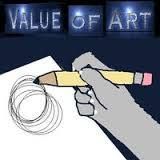What is the Value of Art?
Objectivist thinking holds that facts are not subject to our ideals, that our beliefs and our biases cannot alter what is or what exists. However, we can reason and learn from what is. This reasoning helps us develop a sense of the nature of man or of the universe. Art is an expression of those questions, and of that learning process, and thus has value as an expression the artist chooses to make about the world around him.
Artists are individuals who have a perspective on these important questions, and the ability to filter that perspective through a chosen medium. The artist is able to take abstract ideals related to the world around him and fashion them into the concrete, that which can be observed.
Art, while an interpretation of reality, also reinforces it. We can see art, and in some cases we can touch it too. Art is something we can record, objectively, as an event that happened. It exists as a memory of the world we once knew. A glimpse into the past. Art can be almost spiritual in the way it connects us with reality, and with our own history.
 Art is both good and bad depending on the objective standards of those who observe it. Art, while difficult to interpret at times, is something we can quantify and define.
Art is both good and bad depending on the objective standards of those who observe it. Art, while difficult to interpret at times, is something we can quantify and define.
Art is also fiercely connected to reason, as it is the artist’s expression of the world around him. Thus, in order for something to be considered art at all, it must be representative of the mental connections the artist maintains with reality.
